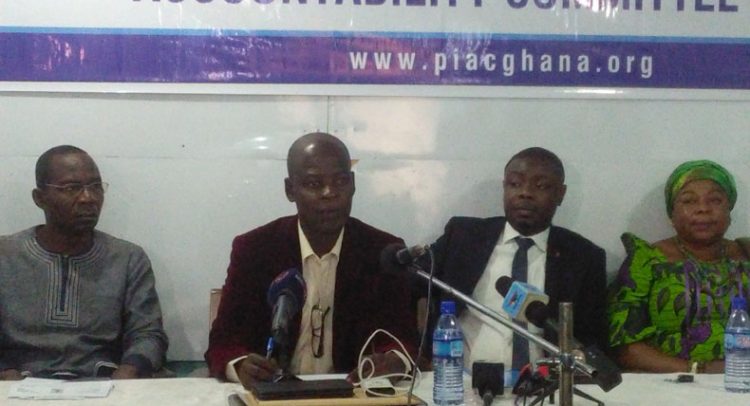Dr Steve Manteaw (2nd left) addresses the media fl anked by other committee members
About 50 percent of petroleum revenue-funded projects in 2016 and 2017 are non-existent, according to Public Interest & Accountability Committee (PIAC).
PIAC, which disclosed this to journalists yesterday in Accra, stressed the need for intensified inspection of the 46 projects over the period in the Upper East, Upper West, Northern, Ashanti, Eastern Greater Accra and Volta Regions.
“This exercise was aimed at gathering and obtaining first-hand information on the quality and impact of projects funded with petroleum revenues at the sub-national levels,” Dr Steve Manteaw, chairman of the committee, said.
Non-involvement of MMDAs
“In almost all cases, interactions with beneficiaries and local authorities revealed that there was no involvement of communities and beneficiary institutions in the project selection and/or implementation, making tracking and demand for accountability difficult. For example, at Apedwa SDA Primary School in the East Akim Municipality of the Eastern Region, the assembly was unaware of the existence of an ABFA funded project until the PIAC team arrived.
“Same can be said about the Agogo Saviour D/A Primary School in the Asante Akim North Municipality Education Directorate and the Assembly denied knowledge of the award processes of this project. Several other cases exist across the districts visited,” he emphasised.
Insufficient allocations
The committee said it was deeply concerned about the paltry sums allocated to some key projects, which did not contribute significantly to the total cost of these projects.
“For instance, GH¢15,323.00 was allocated for the surfacing of Fomena town roads. Similarly, an amount of GH¢15,970.00 was allocated for the rehabilitation of the Nakori Dam in the Wa Municipality of the Upper West region visited in 2016.
“It was not surprising that work had not been done at the Nakori Dam Site. An interview with the assembly man revealed that, indeed, no contractor had been to the dam site since 2007.”
Delayed execution
PIAC further indicated that delays in the execution of some projects, particularly roads, had resulted in substantial cost variations running into millions of Ghana cedis with associated effects on value for money. It revealed that bitumen surfacing of New Tafo-Nobi-Samlesi-Anwiabeng feeder road, which was executed on schedule (2012-2014) resulted in cost savings of GH¢360,969.29 from the analysis of contract details obtained from the Department of Feeder Roads.
On the contrary, contract documents from the Ghana Highway Authority revealed that the Anyinasu-Sekyredumasi Road in the Ashanti Region which delayed for three years (started in 2011, with initial completion in 2013 and revised completion in 2016), attracted a cost overrun of GH¢28,856,866.71.”
Shoddy works
Dr Manteaw said “over 50 percent of projects inspected showed signs of serious deterioration in less than three (3) years after completion. A 6-unit classroom block at Apedwa SDA Primary School in the East Akim District had begun to sink due to poor siting and shoddy work according to authorities of the school and the Municipal Assembly.
“Several attempts by PIAC to obtain further details of these projects from the Ministry of Education have proved futile.”
General observations
He continued: “It is worthy to note that the construction or rehabilitation of projects without the provision of complementary facilities does not result in the maximization of intended results. For instance, a newly constructed six-unit classroom block at Bishop Herman College in the Kpando Municipality of the Volta region had no louvers, ceiling, locks and furniture, albeit being used. This was a rampant occurrence in a number of newly constructed and rehabilitated facilities inspected across the districts.”
“There was little coordination between the implementing Ministries/Agencies and beneficiary MMDAs in the selection, award, execution and monitoring of projects. Consequently, the implemented projects in the beneficiary communities were usually not aligned with the priority projects in their medium term development plans.”
Dr Manteaw added that the committee observed that the Minister of Finance, over the years, had not complied with the provision of updates on the status of implementation of ABFA funded projects as required by Section 48 (2b).
Meanwhile, a copy of the report has been submitted to the Auditor General to investigate the issues raised.
By Samuel Boadi


